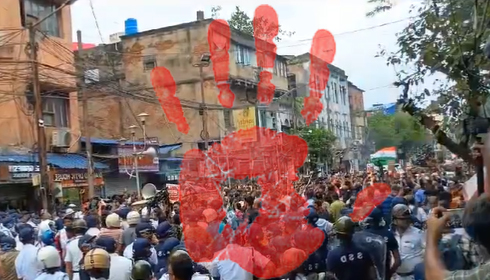
Junior Doctors Stopped from Marching to Lalbazar Stage Sit-in at Central Avenue Crossing
Junior physicians from numerous government hospitals and medical colleges in Kolkata marched to the streets on Monday in a strong show of solidarity, seeking justice for a colleague doctor's brutal rape and murder 23 days ago. The physicians marched from College Street to Lalbazar, dressed in white coats and bearing red roses, articulating their concerns and demanding responsibility.
The doctors demand the resignation of Kolkata Police Commissioner Vineet Goyal and a judicial investigation into the handling of the R.G. Kar case. They also urged Sandip Ghosh's immediate removal, a comprehensive inquiry by the Central Bureau of inquiry (CBI), and the arrest and punishment of those responsible for the atrocity. They also worked to abolish what they term the "politics of fear" in medical schools and advocated for improved safety measures for doctors and medical workers in hospitals and institutions.
The protest march began at 2:00 p.m. at College Square, with junior doctors singing slogans and brandishing banners demanding justice and safety. However, police set up barricades at Bowbazar Central Avenue and Fierce Lane, opposing the peaceful march and preventing the doctors from reaching their original target of Lalbazar. Police dispatched a large number of officers to maintain control of the situation.
"We are not here to cause trouble," claimed Kinjal Nandi, a protest organiser. "This is a nonviolent protest of injustice. We will not go until Commissioner Vineet Goyal either steps down or arrives to address us." Nandi further said that the police had previously suggested that the march may continue to Bentinck Street and Bibi Ganguly Crossing, but then unexpectedly reversed their attitude.
Reports that the Kolkata Police mismanaged evidence in the R.G. Kar case, specifically that Commissioner Vineet Goyal tampered with evidence to protect the accused, have fuelled the doctors' fury. The current court verdict also implies that the police may have deleted critical evidence, further infuriating the medical community. Moreover, the doctors questioned the police's lack of action on the day of the incident, asserting that the crime was clearly visible to law enforcement, but they have yet to make any arrests.
A demonstrator stated, "We are here to demand accountability and justice, not just for our colleagues but for all medical professionals who put their lives at risk every day." "We want accountability and justice for our colleagues and all medical professionals who risk their lives every day."
As the demonstration reached a stalemate at the police barriers, tensions rose. The doctors, undeterred by the obstructions, sat down in protest and refused to leave until their demands were satisfied. However, the police remained unwavering, asserting that all processions must conclude at Fierce Lane and that they would not allow any further protests.
Rupesh Kumar, Deputy Commissioner of Police (Traffic), emphasised the execution of Section 163 of the Indian Penal Code (IPC) in the region, suggesting a stringent no-protest zone beyond the designated bounds. "We have stopped all processions here in the past, and we will continue to do so today," he declared. "We will only allow twenty representatives from the protest to proceed to Lalbazar."
Despite the constraints, the demonstrators refused to disperse. "We will continue our sit-in until Commissioner Goyal addresses us or resigns," added another demonstrator. We cannot overlook this issue."
The junior doctors' protest is a sobering reminder of the rising desire for justice and safety in the medical community. Despite the tight situation, the doctors have vowed to persist in their fight until they receive meaningful steps to address their concerns.
"We are here for justice," declared one of the demonstration leaders. "Not just for our colleague who was brutally taken from us, but for every doctor who deserves to work in a safe and secure environment."
The protest, known as the "Lalbazar Campaign," has received significant support from different segments of society, emphasising the urgent need for structural reforms to ensure the safety and protection of healthcare workers in India.